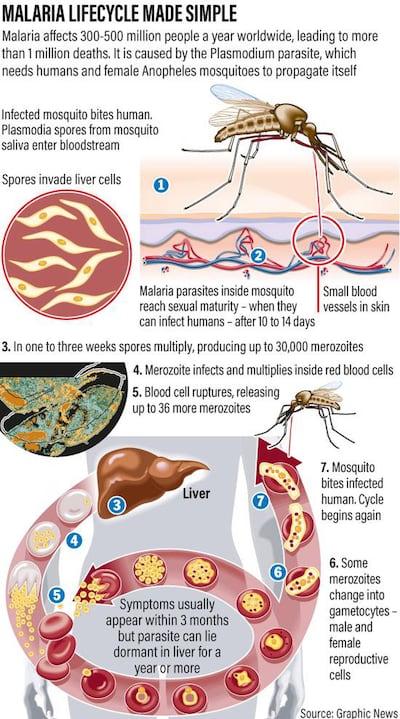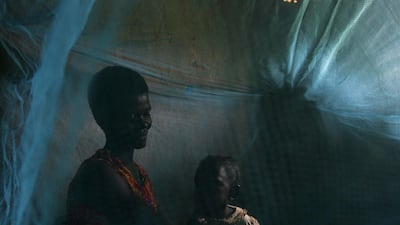Sheikh Mohamed bin Zayed, Crown Prince of Abu Dhabi and Deputy Supreme Commander of the Armed Forces, said that UAE is committed to eradicating malaria.
On World Malaria Day, April 25, Sheikh Mohamed said on Twitter that the Emirates will continue to work with international partners to fight the disease.
"We strive to harness the power of innovation to reduce the burden of preventable diseases, accelerate their eradication and bring new hope and opportunity to people around the world,” he said.
"On World Malaria Day, we remain committed in the fight to end malaria through global partnerships and will continue to work with the global community to lead on innovative and equity-driven programmes to save millions more lives.”
The UAE is a major contributor in the fight to make malaria history through the Roll Back Malaria initiative.
Sheikh Mohammed has donated millions of dollars to fight the disease.
With a total contribution of Dh19.32 billion of developmental aid in 2017, the UAE spent 1.31 per cent of its gross national income on foreign developmental aid — almost twice the global target of 0.7 per cent set by the UN, according to state news agency Wam.
The donations in 2017 represent a 23.72 per cent increase on the year before, when the UAE contributed Dh15.57 billion.
The World Malaria Day message calls for continued investment and political commitment to prevent and control the disease. The day was first marked by World Health Organisation member states during the World Health Assembly of 2007.
Malaria is a preventable and treatable disease, but WHO and its partners have reported that progress against it is in danger of stagnating.
According to WHO data, in 2020, there were an estimated 241 million new cases of malaria and 627,000 malaria-related deaths in 85 countries. More than two-thirds of deaths were among children under the age of 5 living in the WHO African region.
In recent years, researchers have developed tools and technologies to fight the disease, such as insecticide-treated nets, spatial mosquito repellents and gene-drive approaches.
In October 2021, the WHO also recommended the broad use of the RTS, S malaria vaccine for young children living in areas with moderate and high transmission of the disease.
The WHO said it made recommendations based on the findings of a pilot programme in Ghana, Kenya and Malawi that has reached more than 900,000 children since 2019.
The WHO said its scheme could save the lives of between 40,000 and 80,000 children each year.
The latest data shows that more than a million children in Ghana, Kenya and Malawi have now received at least one dose of RTS, S, the first anti-malaria vaccine.

The breakthrough vaccine was pioneered in Malawi in April 2019 and found to be safe and to substantially reduce severe cases of the disease, the WHO said in a World Malaria Day statement.
"This vaccine is not just a scientific breakthrough, it's life-changing for families across Africa,” WHO director general Tedros Adhanom Ghebreyesus said.
"It demonstrates the power of science and innovation for health. Even so, there is an urgent need to develop more and better tools to save lives and drive progress towards a malaria-free world.”
The vaccine is manufactured by British pharmaceutical company GSK and more than $155 million has been provided by Gavi, the Vaccine Alliance, for the delivery of the vaccines, the statement said.
The organisation welcomed progress in the development of other treatments, too, but said more funding was needed in the fight against malaria — an average of $851m a year over the period 2021-2030.
About 90 per cent of the world's malaria cases are recorded in Africa, where 260,000 children die from the disease each year.
What is the malaria vaccine?
RTS, S is a first-generation vaccine that could be complemented by other vaccines with similar or higher efficacy.
Other vaccines such as R21/Matrix-M are in early clinical development. The successful completion of trials for these vaccines will be important to assess their safety and efficacy.
Pharma company BioNTech, manufacturer of the Pfizer-BioNTech coronavirus vaccine, has said that it is developing a malaria vaccine using mRNA technology.









